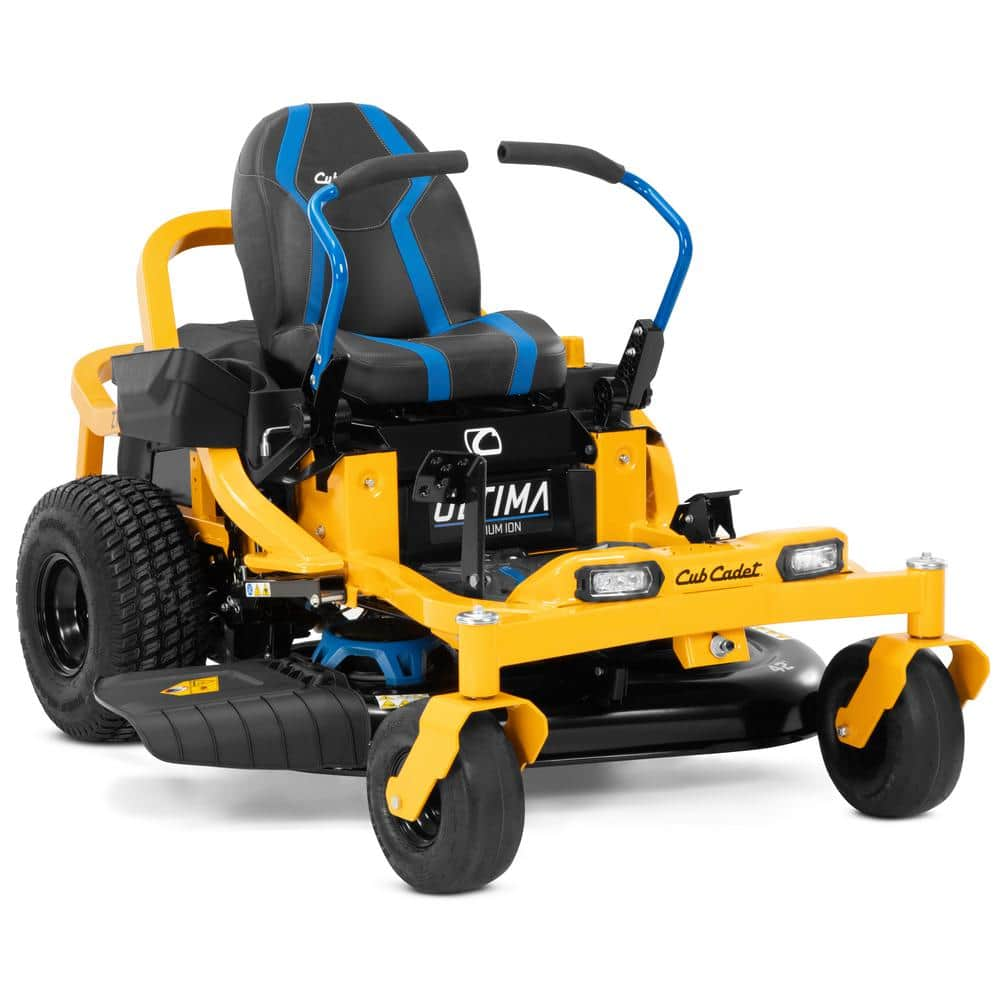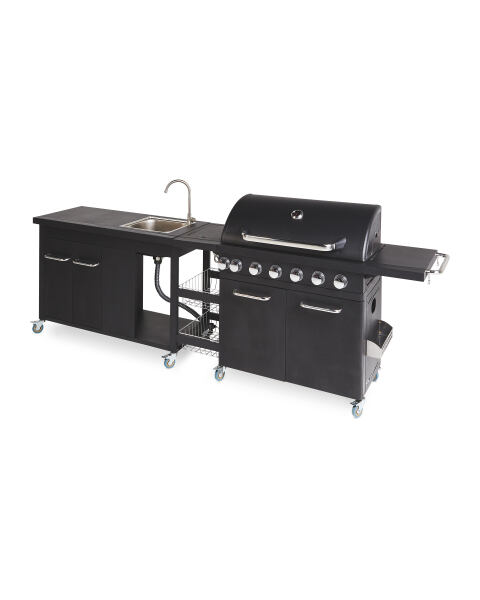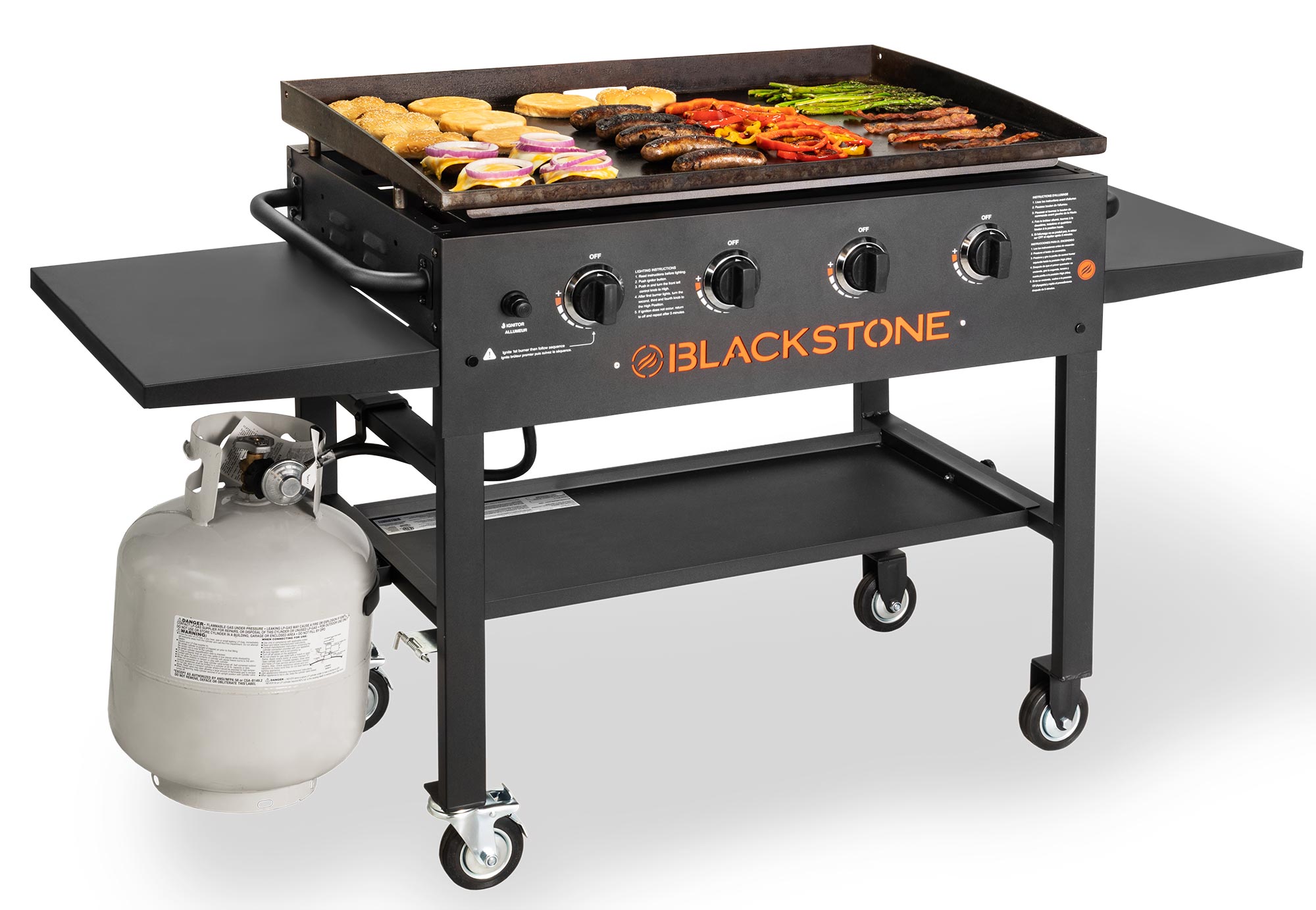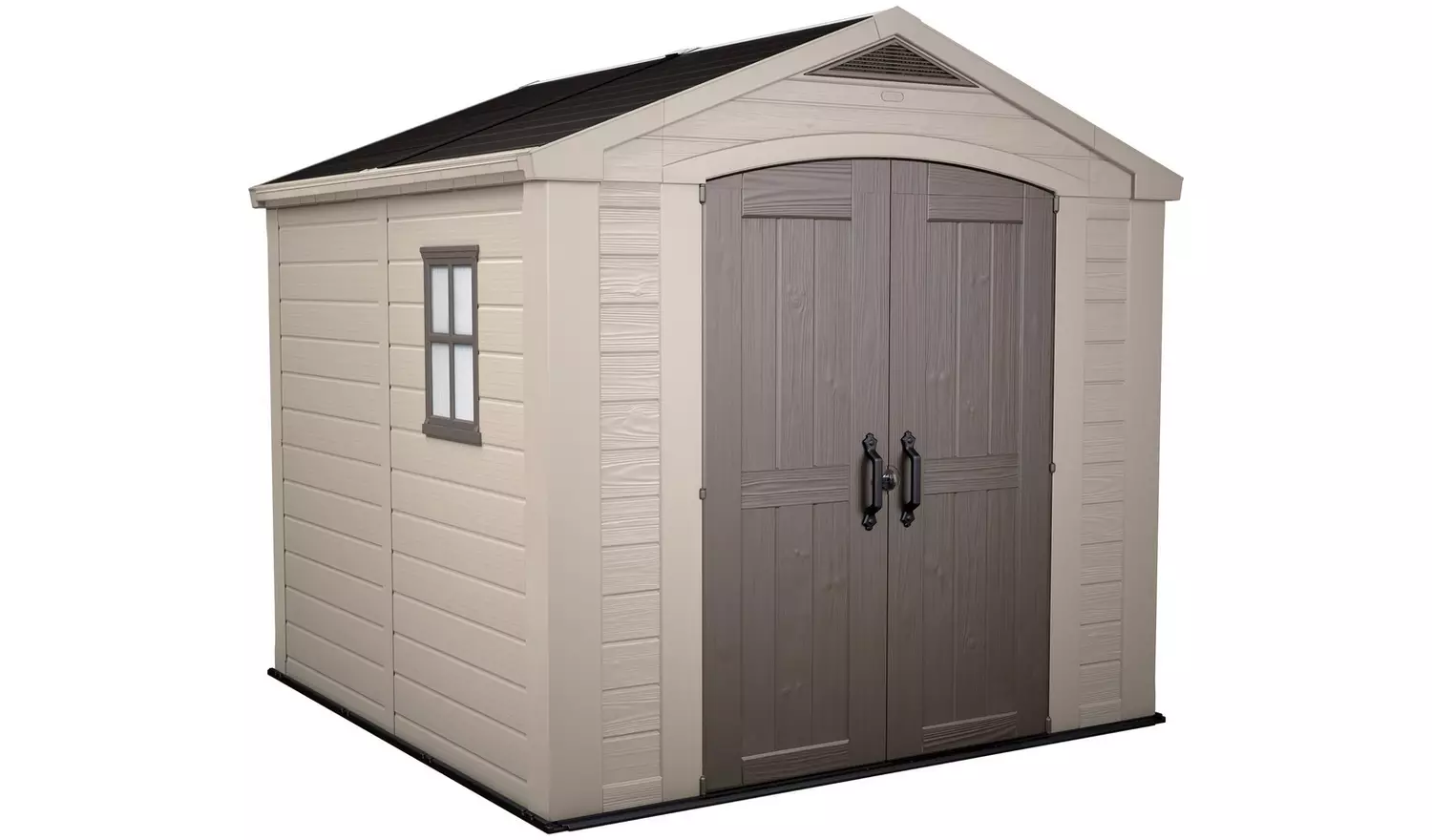Cub Cadet Ultima ZT1 42 in. 56-Volt MAX 60 Ah Battery Lithium-Ion Electric Drive Zero Turn Riding Lawn Mower
Battery operated: no gas, oil, air filters, spark plugs or belts. Cut up to 2-acres per charge, full recharge in only 4 hours. Features a high-back seat and a USB charging port.
The industry-leading Ultima Series that delivers strength, comfort and quality is now available in a fully electric lithium-ion battery powered zero turn mower. This latest battery technology provides a quiet operation and extended run time with rapid recharge and no power fade, delivering uncompromising power, minimal maintenance and the cut quality you can expect from its gas counterpart. The ZT42E comes equipped with a 42 in., twin blade cutting deck that can power through up to 2 acres without any power fade. Automotive-grade corrosion defense system will protect your 2 in. x 2 in. tubular steel frame from wear and tear, preserving your lawn mower. Large rear tires provide enhanced traction on uneven terrain. Recharge quickly in just 4-hours. Ride in comfort up to 7 MPH with a premium cut and sew high back 20 in. seat, 2 USB charging ports and a cup holder. This hassle-free, easy-to-use mowing experience is all backed by an industry leading warranty, 3-year limited residential and a 4-year limited battery.
- Quiet operation with no engine maintenance, no oil changes, no belts and no gas provides a hassle-free, easy-to-use mowing experience
- 56-Volt MAX, 60 Ah, 3000-Watt hour lithium-ion battery that can be charged using a standard 110-Volt outlet
- No exhaust, carbon monoxide or unburned hydrocarbons from the on-board source of power
- 2 in. x 2 in. tubular steel frame with an automotive-grade corrosion defense system to protect against wear and tear
- Backed by a 3-year limited residential and 4-year limited battery warranty
- Dual automatic electric transmissions quickly leaves your lawn with a professional finish
- 20 in. x 8 in., rear wheels provide excellent traction, minimize turfing and provide a better ride on uneven ground at higher speeds
- Equipped with 2 USB ports to charge devices while you mow and a cup holder for your beverage
- 13 Gauge, 42 in., twin blade deck with 3 mowing options: side discharge, bagging or mulching
- Foot pedal with spring assist deck lift and 15 positions
- LED headlights for advanced lighting and maximum visibility to mow when you want
- Ride in comfort with a 20 in. premium high-back adjustable seat, a rubber floor mat and a durable, advanced polymer seat suspension system
- Adjustable lap bars and industry-exclusive ergonomic hand grips optimized for comfort providing you the confidence to maximize your speed and reduce operator fatigue
- RZT comes fully crated and requires minor assembly
Additional information
| Assembled Depth x Height x Width (in.) | 82 x 35 x 48 |
|---|---|
| Cutting Width (in.) | 42 |
| Front Wheel Size (in.) | 11 |
| Mower Deck Width (in.) | 42 |
| Rear Wheel Size (in.) | 20 |
| Turning Radius (in.) | 0 |
| Certifications and Listings | CARB Compliant |
| Manufacturer Warranty | 3-Year Limited Warranty |
56 may refer to:
- 56 (number)
- One of the years 56 BC, AD 56, 1856, 1956, 2056
- 56.com, a Chinese online video platform
- Fiftysix, Arkansas, an unincorporated community in the United States
- Fifty-Six, Arkansas, a city in the United States
- "Fifty Six", a song by Karma to Burn from the album Arch Stanton, 2014
- 56 Melete, a main-belt asteroid
60 may refer to:
- 60 (number)
- one of the years 60 BC, AD 60, 1960, 2060
- Neodymium, the 60th element
- <, the ASCII character with code 60
- Base 60 (sexagesimal, sexagenary)
- "Sixty", a song by Karma to Burn from the album Mountain Czar, 2016
- 60 Echo, a main-belt asteroid
Battery or batterie most often refers to:
- Electric battery, a device that provides electrical power
- Battery (crime), a crime involving unlawful physical contact
Battery may also refer to:
A cadet is a student or trainee, and is typically used in military settings to denote an individual undergoing training to become commissioned officers. Several civilian organisations, including civil aviation groups, maritime organisations, and police services, also designate their trainees as cadets.
A cub is the young of certain large predatory animals, such as big cats and bears.
Cub or CUB may also refer to:
An ion () is an atom or molecule with a net electrical charge. The charge of an electron is considered to be negative by convention and this charge is equal and opposite to the charge of a proton, which is considered to be positive by convention. The net charge of an ion is not zero because its total number of electrons is unequal to its total number of protons.
A cation is a positively charged ion with fewer electrons than protons while an anion is a negatively charged ion with more electrons than protons. Opposite electric charges are pulled towards one another by electrostatic force, so cations and anions attract each other and readily form ionic compounds.
Ions consisting of only a single atom are termed atomic or monatomic ions, while two or more atoms form molecular ions or polyatomic ions. In the case of physical ionization in a fluid (gas or liquid), "ion pairs" are created by spontaneous molecule collisions, where each generated pair consists of a free electron and a positive ion. Ions are also created by chemical interactions, such as the dissolution of a salt in liquids, or by other means, such as passing a direct current through a conducting solution, dissolving an anode via ionization.
A lawn () is an area of soil-covered land planted with grasses and other durable plants such as clover which are maintained at a short height with a lawn mower (or sometimes grazing animals) and used for aesthetic and recreational purposes—it is also commonly referred to as part of a garden. Lawns are usually composed only of grass species, subject to weed and pest control, maintained in a green color (e.g., by watering), and are regularly mowed to ensure an acceptable length. Lawns are used around houses, apartments, commercial buildings and offices. Many city parks also have large lawn areas. In recreational contexts, the specialised names turf, pitch, field or green may be used, depending on the sport and the continent.
The term "lawn", referring to a managed grass space, dates to at least the 16th century. With suburban expansion, the lawn has become culturally ingrained in some areas of the world as part of the desired household aesthetic. However, awareness of the negative environmental impact of this ideal is growing. In some jurisdictions where there are water shortages, local government authorities are encouraging alternatives to lawns to reduce water use. Researchers in the United States have noted that suburban lawns are "biological deserts" that are contributing to a "continental-scale ecological homogenization." Lawn maintenance practices also cause biodiversity loss in surrounding areas.
Lithium (from Ancient Greek λίθος (líthos) 'stone') is a chemical element; it has symbol Li and atomic number 3. It is a soft, silvery-white alkali metal. Under standard conditions, it is the least dense metal and the least dense solid element. Like all alkali metals, lithium is highly reactive and flammable, and must be stored in vacuum, inert atmosphere, or inert liquid such as purified kerosene or mineral oil. It exhibits a metallic luster. It corrodes quickly in air to a dull silvery gray, then black tarnish. It does not occur freely in nature, but occurs mainly as pegmatitic minerals, which were once the main source of lithium. Due to its solubility as an ion, it is present in ocean water and is commonly obtained from brines. Lithium metal is isolated electrolytically from a mixture of lithium chloride and potassium chloride.
The nucleus of the lithium atom verges on instability, since the two stable lithium isotopes found in nature have among the lowest binding energies per nucleon of all stable nuclides. Because of its relative nuclear instability, lithium is less common in the solar system than 25 of the first 32 chemical elements even though its nuclei are very light: it is an exception to the trend that heavier nuclei are less common. For related reasons, lithium has important uses in nuclear physics. The transmutation of lithium atoms to helium in 1932 was the first fully human-made nuclear reaction, and lithium deuteride serves as a fusion fuel in staged thermonuclear weapons.
Lithium and its compounds have several industrial applications, including heat-resistant glass and ceramics, lithium grease lubricants, flux additives for iron, steel and aluminium production, lithium metal batteries, and lithium-ion batteries. These uses consume more than three-quarters of lithium production.
Lithium is present in biological systems in trace amounts. It has no established metabolic function. Lithium-based drugs are useful as a mood stabilizer and antidepressant in the treatment of mental illness such as bipolar disorder.
A mower is a person or machine that cuts (mows) grass or other plants that grow on the ground. Usually mowing is distinguished from reaping, which uses similar implements, but is the traditional term for harvesting grain crops, e.g. with reapers and combines.
A smaller mower used for lawns and sports grounds (playing fields) is called a lawn mower or grounds mower, which is often self-powered, or may also be small enough to be pushed by the operator. Grounds mowers have reel or rotary cutters. Larger mowers or mower-conditioners are mainly used to cut grass (or other crops) for hay or silage and often place the cut material into rows, which are referred to as windrows. Swathers (or windrowers) are also used to cut grass (and grain crops). Prior to the invention and adoption of mechanized mowers, (and today in places where use a mower is impractical or uneconomical), grass and grain crops were cut by hand using scythes or sickles.
To turn is to rotate, either continuously like a wheel turns on its axle, or in a finite motion changing an object's orientation. Turn may also refer to:
The volt (symbol: V) is the unit of electric potential, electric potential difference (voltage), and electromotive force in the International System of Units (SI).






by Art
The mower is a bit tricky to start due to safety features requiring to apply the brake and push the button holding it a few seconds. It also requires some learning to get used to too responsive and powerful wheel motors to make it move in the direction you want. Once you learn all of that you have a very quiet and very powerful machine that never gets stuck anywhere. I used it to easily pull a pretty heavy cart where my old Husqvarna 24hp mower would definitely fail to pull due to poor wheel traction with the ground. No disgusting fumes, no noises and no hassle with the fuel and maintenance is a huge plus for me. Hope it lasts a long time.
by Gary
The mower arrived yesterday, well-crated and in good shape. Final assembly was easy and quick, no more than 5 minutes or so. The hardest part was getting it off of the pallet and craft without hitting the deck. We were able to do it, using 2 guys in the front, lifting up the front section, while one pushed from the rear (make sure to disengage the parking brake!) I did not have any errors as others have described when attempting to use the mower for the first time. The mower arrived in a low state of charge, so I allowed it to fully charge before moving the unit. The drive mechanism is a bit “jerky” when first engaging. Perhaps there will be an update to smooth out the power curve, but it’s not that bad and I’m sure we’ll adapt to it quickly. Overall, I’m impressed so far. Time will tell how this holds up, but I’ll take a few growing pains to not have to deal with small-engine maintenance.
by Wallace
Having driven nearly every manufacture of zero-turn mower, call it an idiosyncrasy or just good times, from gas to diesel, propane to electric I will say firstly the cons. Initially, see the question regarding E108 fault code, as was the case with me, yet no help for me from the manufacture. Next the electric response isn’t as fluid as hydrostatic. I thought this was strange, given it is DC electrical current, and we know DC power is paramount because of its smooth flow and even voltage. Just increase the current thank you, but alas at the onset it can sputter, and if you leave it there it will be a jittery ride, but it is minutely responsive. That means small movements mean movement. Takes a minute to get used to. Especially when historically you have to move your arms to move a zero-turn. Slight movements here please, or you will run over a fence, as in my case, or whatever happens to be at your side- that happened in the first 5 minutes, so keep folks onlooking at a distance when you begin please. Luckily no harm no fowl in my regard. Despite the technological/electrical learning curve it is a great mover, and I highly recommend it. See my answer to question number one regarding fault code E108, for I’d like to save you the phone call, as Cub Cadet recommended, and an irritated wife who can’t get out of the garage, since they didn’t have an answer for me. At any rate, it’s relatively quite, triple fast, I scarcely say anyone could mow out of slow with this thing- challenge posted, nice seat but it should have the arms attached at $4500 not an accessory, oh one more thing you might find irritating, as I do when repeating nonsensical actions. When you exit the mower for whatever reason, move a branch, fix the fence you just ran over, get a drink- water please, you have to set it back to initial mow setup each time before you can start mowing again. This means locking the brake, setting the levers outboard, pushing start again, then you can push the mow button. This should have an over-ride to keep you fluidly mowing not repeating steps from the onset. I realize and appreciate safety as a foundation- initially, but once that has been established let me get to work; I have acknowledged what I am doing- thank you. It is a great mower, your neighbor will love it, your brother-in-law will call it HAWT, your daughter will want to immediately mow with it and letting your offspring expound their sense of purpose and prowess you will allow this for fostering their acumen is a fatherly foundation- just go get the wire and fence stretcher first.